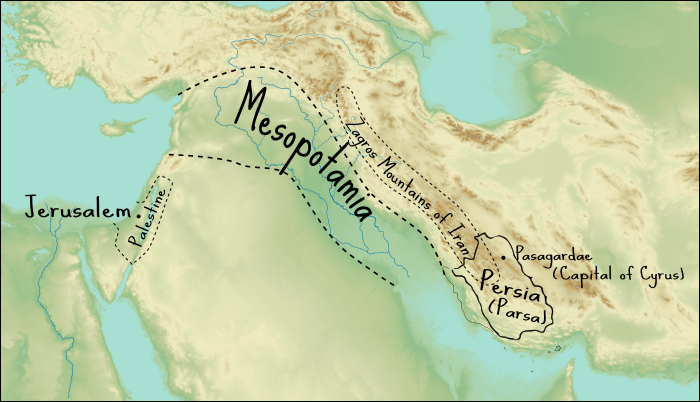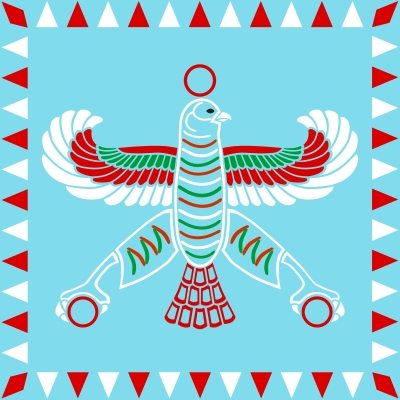Is Felix Y Manalo the bird of prey in Isaiah 46:11?

Isaiah 46:11 (ESV) - 11 calling a bird of prey from the east,
the man of my counsel from a far country.
I have spoken, and I will bring it to pass;
I have purposed, and I will do it.
The "Iglesia Ni Cristo" claims that the bird of prey in Isaiah 46:11 refers to Felix Y Manalo. Others say it is probably referring to Cyrus. Which position is correct?
When we examine the Bible, ancient geography, and ancient Hebrew, we see that the INC's claim is based on several faulty understandings. This verse does not speak of Felix Y Manalo.
This article is a response to a specific article written by the INC[1] that makes several claims about language and geography in attempt to disprove that these verse could not be speaking of Cyrus. We will examine those claims here, and as we do it may be helpful to reference both the INC's article as well as this map:

Ancient Persia and modern-day Iran do not share the same boundaries.
The INC correctly identifies that Cyrus is from Persia. However, in their article discussing Cyrus, the INC seems to assume that because ancient Persia was situated within modern-day Iran, their borders are identical. This is not the case. When we speak of Persia as the home country of the ancient Persians - and not as the entire empire which extends much farther than the boundaries of modern-day Iran - we refer to the area now known as the Iranian province of Fars (or Pars).
As one historian puts it:
The ancient core of the Empire was southwestern Iran - ancient Parsa (Greek, Persis), the geographic area synonymous with the name "Persia" that was subsequently applied to the entire country. Parsa, more specifically equivalent with modern Fars, is dominated by the southern part of the Zagros Mountains...[2]
Ancient Persia (Parsa) is not in Mesopotamia.
The INC cites a source which describes Mesopotamia as the land "bordered on the north by the mountains of Kurdistan, to the south by the marshes of the river delta, to the west by the Syrian steppes and deserts and to the east by the mountains of Iran." This is a reasonable definition of Mesopotamia. However, the issue arises when the INC asserts that ancient Persia is within boundaries of Mesopotamia.
First, we notice that we consider the eastern boundary of Mesopotamia to be the mountains of Iran. The mountains of Iran are on the western side of Iran, which means that Mesopotamia does not extend into Iran; it stops at the edge of Iran.
Furthermore, as previously mentioned, ancient Persia is not identical to Iran. As we read earlier, Persia is dominated by the southern part of these mountains, placing it below the river delta, the southern boundary given to us by this quote. So not only is ancient Persia east of Mesopotamia, it's also south of Mesopotamia!
Persia does not have to be referenced by "qedem".
The INC asserts that Persia must be referred to be the Hebrew word "qedem" (meaning east) because "qedem" is often used to refer to Mesopotamia and refers to the near east. There are multiple problems with this assertion.
First and foremost, we have already demonstrated that ancient Persia (Parsa) was not actually in Mesopotamia, so there is no grounds for saying that a word used to describe the location of Mesopotamia must be used of Persia.
Secondly, "qedem" does not refer to the near east in such a fuzzy manner. "Qedem" specifically refers to a neighboring or bordering location. Looking at the broader context of the citation provided by the INC, we see it says:
Again, kedem is used in a strictly geographical sense to describe a spot or country immediately before another in an easterly direction...on the other hand, mizrach is used of the far east with a less definite signification.[3]
In other words, this word may be used of Mesopotamia because Mesopotamia is immediately east of Palestine. However, any subregion, country, or city within Mesopotamia is not immediately east of Palestine. Therefore, we wouldn't expect to see this word used of Persia even if Persia were in Mesopotamia.
Persia may be referenced by "mizrach".
Going back to the quote about the words "qedem" and "mizrach", we see that the article is not that mizrach literally means "far east", but that it means an unspecified east, which may not be in immediate proximity. Therefore, the word Mizrach could easily be applied to Persia since it does not neighbor Palestine.
Isaiah specifically speaks of God's plan to use Cyrus.
In the chapter just before Isaiah 46:11, God had clearly stated his plan to save Israel through Cyrus:
Isaiah 45:1 (ESV) - 1 Thus says the Lord to his anointed, to Cyrus,
whose right hand I have grasped,
to subdue nations before him
and to loose the belts of kings,
to open doors before him
that gates may not be closed:
...
5 I am the Lord, and there is no other,
besides me there is no God;
I equip you, though you do not know me,
6 that people may know, from the rising of the sun
and from the west, that there is none besides me;
I am the Lord, and there is no other.
Isaiah tells us God's purpose in calling Cyrus very clearly. Comparing this purpose to the purpose of the bird of prey we see they are the same.
Isaiah 46:9-11 (ESV) - 9 remember the former things of old;
for I am God, and there is no other;
I am God, and there is none like me,
10 declaring the end from the beginning
and from ancient times things not yet done,
saying, 'My counsel shall stand,
and I will accomplish all my purpose,'
11 calling a bird of prey from the east,
the man of my counsel from a far country.
I have spoken, and I will bring it to pass;
I have purposed, and I will do it.
Given that the context is about Cyrus and Israel throughout Isaiah 45 and Isaiah 46, the bird of prey can hardly be anyone other than Cyrus. Even more, Cyrus was often represented as an eagle, a bird of prey.[4]


An image of Cyrus and his standard/flag.
Conclusion
The bird of prey in Isaiah most likely refers to Cyrus and definitely does not refer to Felix Y Manalo. The INC's argument against this position relies on a faulty understand of geography, history, language, and scripture.
We should not base our beliefs on unsound claims of fulfillment of prophecy, but on what the scriptures actually say. We should not look for a new messenger, but listen to God's messenger in these last days, whom he has already given us: Christ.
Hebrews 1:1-2 (ESV) - 1 Long ago, at many times and in many ways, God spoke to our fathers by the prophets, 2 but in these last days he has spoken to us by his Son, whom he appointed the heir of all things, through whom also he created the world.
[1] Here is the INC's article explaining why they do not believe this passage to be speaking of Cyrus.
[2] p6, Matt Waters, Ancient Persia: A Concise History of the Achaemenid Empire, 550-330 BCE
[3] Cyclopedia entry on "East"
[4] See the Wikipedia entry on Cyrus the Great.
